Disney Princess Lost in the Real World
Disney Princess is a franchise with a line-up of fictional female heroines who have appeared in various Disney animated feature films. Owned by the Walt Disney Company, and created in the mid-1990s.
The franchise currently comprises of twelve female protagonists from eleven different Walt Disney Animation Studios films and one Pixar film, who are either royal by birth, royal by marriage, or considered a "princess" due to their significant portrayal of heroism in their respective films.
The character line-up has varied since the creation of the franchise. Currently, the franchise is comprised of 12 members: Snow White, Cinderella, Aurora, Ariel, Belle, Jasmine, Pocahontas, Mulan, Tiana, Rapunzel, Merida, and Moana.[1]
The Disney Princesses are featured prominently through theme parks, dolls, jewelry and apparel, video games, and crossover feature films and television shows.
From 2012 to 2021, with the exception of those created after the Disney Renaissance, the Princesses are showcased in their enhanced and modified redesigned outfits instead of the ones that they wear in their own movies. The classic looks from their movies were brought back and enhanced for the Ultimate Princess Celebration event.
Contents
- 1 History
- 2 Character Background
- 3 Members
- 3.1 Official members
- 3.1.1 1. Snow White
- 3.1.2 2. Cinderella
- 3.1.3 3. Aurora
- 3.1.4 4. Ariel
- 3.1.5 5. Belle
- 3.1.6 6. Jasmine
- 3.1.7 7. Pocahontas
- 3.1.8 8. Mulan
- 3.1.9 9. Tiana
- 3.1.10 10. Rapunzel
- 3.1.11 11. Merida
- 3.1.12 12. Moana
- 3.2 Unofficial Princesses
- 3.1 Official members
- 4 Sub-franchises
- 4.1 Royal Toddlers
- 4.2 Palace Pets
- 5 Other media
- 5.1 Kingdom Hearts series
- 5.2 Kilala Princess series
- 5.3 Ralph Breaks the Internet
- 6 Disney Parks
- 6.1 Mickey's Pirate and Princess Party
- 7 Gallery
- 8 Trivia
- 9 See also
- 10 References
- 11 External links
History
In the early 1990s, Disney Consumer Products realized the market potential for the female characters portrayed in the wildly successful Disney movies. Soon after realizing the demand, the Disney Princess franchise was launched.
In the mid-1990s the princesses began to be marketed together in the doll lines Perfume Princess, Musical Princess, and Dancing Princess.
On March 12, 1996, Walt Disney Records released the first compilation of the franchise: Princess Collection. The album went on to peak at #4 on Billboard's Top Kid Audio chart.[2]
The first issue of the Disney Princess Magazine was published on June 24, 1998 in the United Kingdom. Its slogan was "Every girl can be a Princess!". The launch of the magazine was supported by radio, press and retail promotions, including a cross-promotion with Mattel in Toys 'R' Us and with Panini stickers.[3] [4]
The Princesses to be featured in the franchise were chosen from classic Disney films. The characters were not chosen specifically for their royal titles, but rather for how well they fit into what Disney executives deemed "the Princess mythology". Mulan is an example of this concept; she has no familial ties to royalty but is still included in the character list. Tinker Bell and Esmeralda were once included under the same principle before it was decided that they were not suited for the "mythology".[5] [6] In 2005, though, Tinker Bell has starred in her own Disney franchise, the Disney Fairies. Other fairies were created specifically for the franchise. The line began with a book series by Gail Carson Levine and has since spawned toys, direct-to-video movies and other products based on the characters. At one point, Jane Porter, Giselle, Anna, and Elsa were considered to be included in the line-up, but weren't realized.
Character Background
The characters themselves, despite appearing in separate films, have distinct similarities. The Princesses show good will towards all creatures, evidenced by the common ability to communicate with animals. The Princesses are known for their inner and outer beauty, as well as having beautiful singing voices, apart from Merida, who only sings a song with her mother when she is little in her film, Brave.
Each Princess, excluding Merida and Moana, has a romance that is resolved by the end of her debut film. These charismatic girls carry a similar personality in their eras.
At the beginning with the first three (Snow White, Cinderella, and Aurora), their characteristics were well known as classy, graceful, and romantic daydreamers, who suffered from the actions caused by others. They held an inner strength through compassion, love, kindness and, particularly with Cinderella, a strong sense of resilience, without having to demonstrate the more masculine, proactive traits of the later Princesses.
Since the Renaissance Era, these popular heroines became more active than reactive with Ariel, Belle, Jasmine, Pocahontas, and Mulan. Their characteristics were known to be much more strong-willed, adventurous, feisty, cunning, and determined. As well their goals focused more on adventure and freedom than love, and these girls were more fighters for their dreams than the first three. They also existed in worlds which were more self-aware of the traditional and changing role of women; particularly Ariel, with her villainess assuring her that women on land should keep silent, Belle, with her villain assuring her that "it's not right for a woman to read", and Mulan, with her peers extolling masculine traits in addition to those of the ideal wife. The most recent ones - Tiana, Rapunzel, Merida, and Moana - are in the modern era; Tiana, an original character, is much more a realist than the others, she does not need nor want magic to make a dream come true but with only hard work, whereas Rapunzel is much more like the idealistic ones than Tiana.
Snow White, Aurora, Ariel, Jasmine, Rapunzel, and Merida are born of royal heritage as daughters of kings and queens. Pocahontas can be considered as being of royal heritage, as she is the daughter of a chief and considered Native American royalty by the English, as well as being called a princess in her film's sequel. Cinderella, Belle, and Tiana become royalty by marriage. Mulan was neither royal by birth or marriage, but is still included in the line-up due to her high status by saving China and receiving grace from the Emperor. Moana, herself, states that she is not a princess, but as daughter to a chief, the roles are similar. And just like Mulan, she received grace from Te Fiti for saving the world from destruction.
In the 2016 film Moana, Maui states that princesses have animal sidekicks. This has been evidently shown to be a common characteristic among the official members.
Members
Official members
1. Snow White
The character of Snow White first originated in 1937 from a Brothers Grimm fairy tale "Schneewittchen" about a beautiful German princess with a jealous stepmother. Walt Disney turned this classic fairy tale into his very first animated feature film. Her true love is the Prince, who breaks her sleeping death 'slumber' (caused by the Evil Queen) with love's first kiss. She befriends the seven dwarfs during her stay at their cottage. At age 14, she is the youngest of the Princesses.
2. Cinderella
Based on the most known version of Cinderella stories, "Cendrillon" by Charles Perrault in 1697. In 1950, it was turned into an animated feature-length film by Walt Disney. Cinderella is the eldest of all the Disney Princesses. Her stepmother turned her into the family's sole servant after the death of her father. With magical help from her Fairy Godmother, she attends a royal ball and meets Prince Charming, and eventually marries him, thus freeing herself from her life of servitude. In the two sequels; "Dreams Come True" and "A Twist In Time", Cinderella also manages to repair her relationship with her younger stepsister Anastasia and help her find true love. Cinderella is often considered the leader of the Princesses; often being put in the center of the group shots, and having also been deemed Walt Disney's personal favorite heroine.
3. Aurora
Best known as the heroine of the 1959 animated classic Sleeping Beauty, which is based on Charles Perrault's "La Belle au Bois Dormant". Although her dress changes from blue to pink thanks to a disagreement between two of her guardians, Merryweather and Flora, outside the film, she is most commonly seen wearing pink. She was cursed at birth to die before the sun sets on her 16th birthday by the evil fairy Maleficent by pricking her finger on the spindle of a spinning wheel. One of the three good fairies, Merryweather, was able to weaken the curse by changing death to a deep slumber that could only be awakened by true love's kiss. By falling in love with Prince Phillip, the prince of a neighboring kingdom (and unknown to either of them, her betrothed), she was freed from the curse. Aurora is shown to be one of the taller princesses in the franchise.
4. Ariel
The heroine of the 1989 film, based on the Danish fairy tale "Den Lille Havfrue" by Hans Christian Andersen, and the daughter of King Triton, ruler of the sea. Ariel is a 16-year-old mermaid who falls in love with a dashing human Prince Eric, an extension of her fascination with all things from the surface world. Her dream is to live a life on land. So it comes as no surprise when her dream causes her to fall victim to accepting a shady offer from Ursula the Sea Witch promising her a lifetime of happiness with Prince Eric as long as she carries out the rules outlined in the signed, binding contract. Ursula persuades her to trade her beautiful voice, in exchange for becoming a human for three days. During these three days, Ariel must not only make Prince Eric fall in love with her, but the two must seal their love with a kiss. If Ariel is unable to uphold her end of the agreement, she must return to the sea to live out her days in Ursula's lair as a prisoner, joining the many other "lost souls" that have fallen victim to Ursula's "wish granting" over the years. However, Ariel is able to defeat Ursula with Eric's help and thanks to her father, she becomes human permanently and marries Eric at the end of the film.
Hans Christian Andersen's original character dissolves into foam on the sea after the prince marries someone else, but through an act of compassion is transformed into a spirit of the air. Co-director Ron Clements felt the story was too tragic, and changed the original character from the tragic but hopeful heroine to the brave and resourceful Ariel.
The heroine of the 1989 film, based on the Danish fairy tale "Den Lille Havfrue" by Hans Christian Andersen, and the daughter of King Triton, ruler of the sea. Ariel is a 16-year-old mermaid who falls in love with a dashing human Prince Eric, an extension of her fascination with all things from the surface world. Her dream is to live a life on land. So it comes as no surprise when her dream causes her to fall victim to accepting a shady offer from Ursula the Sea Witch promising her a lifetime of happiness with Prince Eric as long as she carries out the rules outlined in the signed, binding contract. Ursula persuades her to trade her beautiful voice, in exchange for becoming a human for three days. During these three days, Ariel must not only make Prince Eric fall in love with her, but the two must seal their love with a kiss. If Ariel is unable to uphold her end of the agreement, she must return to the sea to live out her days in Ursula's lair as a prisoner, joining the many other "lost souls" that have fallen victim to Ursula's "wish granting" over the years. However, Ariel is able to defeat Ursula with Eric's help and thanks to her father, she becomes human permanently and marries Eric at the end of the film.
Hans Christian Andersen's original character dissolves into foam on the sea after the prince marries someone else, but through an act of compassion is transformed into a spirit of the air. Co-director Ron Clements felt the story was too tragic, and changed the original character from the tragic but hopeful heroine to the brave and resourceful Ariel.
5. Belle
The French commoner who is the heroine of the 1991 animated classic Beauty and the Beast, is based on the French fairy tale "La Belle et la Bête" by Gabrielle-Suzanne de Villeneuve which was abridged by Jeanne-Marie Leprince de Beaumont. The name Belle translates from the French word for "beauty". In the film, she selflessly trades in her freedom, for that of her father's, in a bargain with the Beast, thus becoming his prisoner/guest. She soon learns to see the good hidden behind his hideous appearance and rough manner and eventually, over time, falling in love with him. By confessing her love at the end of the movie, she breaks the curse placed on him by the enchantress. The Beast and his staff are then restored to their human forms, and Belle became his princess.
6. Jasmine
The spunky, independent Arabian Princess of Agrabah, who dreams of seeing what's beyond her palace and be freed from her father's constant pestering of arranged royal marriage. She falls in love with Aladdin, a street rat, and falls in love with him again after he makes a wish from a Genie to become a prince. Though Jasmine did not recognize Aladdin in his prince disguise, she fell in love due to him seeing her as a person and for him having a good heart. After Aladdin reveals his true identity and saves Jasmine and her kingdom from Jafar, Jasmine's father removes the royal law so Jasmine can be with Aladdin, whom she eventually marries.
She is based on Princess Badroulbadour (Arabic بدر البدور, badru l-budūr, "full moon of full moons") featured in the story of "Aladdin and his Wonderful Lamp" from "One Thousand and One Nights" of Scheherazade. Interestingly, the original story took place in China and not the Middle East.
7. Pocahontas
Disney's Pocahontas is based on the real life Native American "princess" of the Powhatan tribe (a name also borne by her father, the chief). Her real name was Matoaka since Pocahontas was her nickname and meant 'Playful One'. She is a free spirit, which she gets from her deceased mother. Pocahontas wants to choose her own path and doesn't want to marry her father's choice for a husband, Kocoum. Once the English settlers arrive, she teaches a man named John Smith about nature and her culture. The two later fall in love. Once John is taken prisoner, Pocahontas helps prevent a war from commencing between their people. At the end of the film, John is wounded and sent back to London for treatment, where Pocahontas remains in her village to look after her people. She is the first woman of color to be the protagonist of her respective film, along with being voiced by an actor of the same ethnicity. She is also the first princess to choose her people over the lover in the end of her feature film.
8. Mulan
Fa Mulan (or simply Mulan) is a brave heroine who impersonates a male soldier to fight for the Chinese Imperial Army in order to protect her ailing father who would have been required to go if she had not gone in his place. Mulan pretends to be her father's son, Ping, risking death, and dishonor if she is discovered. Joining a struggling troop of rookies led by Captain Li Shang (or simply Shang), "Ping" is the driving force behind the troop's dramatic change into respectable soldiers. "Ping" is admired by everyone until "he" is injured during the battle and requires medical care, resulting in the outing of "his" secret. Since "Ping" had saved Shang's life, Shang repays his debt and spares Mulan's life. No longer allowed in the Imperial Army, Mulan goes rogue and defeats the leader of the Hun army, Shan Yu. The Chinese Emperor praises Mulan, recognizing her as a hero for saving China and for bringing honor to her family. Mulan is welcomed back into her home with loving, open arms. Shang arrives at Mulan's home shortly after her return, and the two's feelings for each other are made known.
The character of Mulan is based on the heroine from the well-known ancient Chinese poem "The Ballad of Mulan" (木蘭詩). She is the only Disney Princess who is not royal by blood or marriage. However, she has been bestowed the honor of a being an official Disney Princess because of her popularity as well as what she represents. The film is praised for its cultural authenticity and prevailing messages including family, love, courage, and most notably, the empowerment and equal rights of women.
9. Tiana
Inspired on the princess from the novel "The Frog Princess" by E.D Baker which in turn inspired by a fairy tale "The Frog Prince" by the Brothers Grimm, Tiana is the heroine of the 2009 animated film The Princess and the Frog, and is the first African-American princess. She dreams of opening her own restaurant through hard work. By kissing Prince Naveen in frog form, she is turned into a frog because she kissed him for material gain, not love, and the magic can only be broken by a princess, so they are forced to set on a journey to find a way to undo the magic. Eventually, she finds herself falling for the handsome but spoiled prince who manages to change his ways, and willingly gives up her desires wants to be with him. By marrying the prince, Tiana becomes a real princess, and with her love, breaks the spell with a kiss. They finally open their own restaurant at the end of the film.
Tiana officially became a member of the Disney Princess line-up on March 14, 2010, at the New York Palace Hotel in Manhattan, New York City.
10. Rapunzel
The heroine from the animated feature Tangled is based on the German title character from the Brothers Grimm fairy tale "Rapunzel". Her long hair, which is said to measure 70 feet (21 metres) in length, not only has magical healing powers but can be used as a weapon. Given the power by a magic golden flower, Mother Gothel kidnaps her as an infant to use her power to keep herself young. 18 years later, Rapunzel sneaks away from her tower with a thief, Flynn Rider, and sets on her own journey to find the flying lanterns that float into the sky every year on her birthday. Along the journey, Rapunzel falls in love with Flynn who starts revealing the caring individual he is behind his roguish personality while slowly discovering her true identity as a princess. To free her from Gothel's clutches, Flynn cuts her hair, thus destroying her power, and she is returned to her family before she eventually marries Flynn. Rapunzel was "officially welcomed into the Disney Princess Royal Court" during a promotional event at Kensington Palace in London on October 2, 2011.
11. Merida
Merida is the 16-year-old daughter of Queen Elinor, who rules the kingdom alongside her husband, King Fergus. Queen Elinor's expectations and demands of her daughter make Merida see Elinor as being cold, unfeeling, and distant, causing friction between the two. Despite Elinor's desire to see Merida as a proper royal lady, Merida is an impetuous girl with wild, unruly ginger hair and a passionate desire to take control of her own destiny. Merida has honed her skill with the bow and is the most skilled archers in her kingdom. She is also well-trained in sword-fighting and an expert horsewoman, riding wildly across the countryside on her horse, Angus.
When Merida comes of age to have her hand in marriage, Merida becomes determined to not be forced into marriage, where her actions nearly cause a war between the kingdom and the three clans. After a heated argument with her mother, Merida visits a witch who grants her a spell to change her fate. Merida uses the spell on Elinor in an attempt to make her change her mind about the marriage, only to turn Elinor into a bear. As the two work together in finding a way to break the curse, they manage to rekindle their bond and Merida manages to resolve peace between her kingdom and the clans without being forced into marriage. After preventing a war and the defeat of the demon bear Mor'du, Merida breaks the spell by reconciling with her mother, who becomes human again and the two remain closer than ever before.
She is the first princess from a Pixar film, the first original princess in the line-up that is not inspired by either literature (Snow White, Cinderella, etc.) or real life (Pocahontas, Mulan) works, and the first without a love interest. She also never sings a major song, thus breaking away the traditional line-up, though as a child, she sang a small verse of a song in Gaelic with her mother, and Merida's rich Scottish brogue makes her the second Disney Princess with an accent other than Standard American or British. Merida officially joined the Disney Princess court on May 11, 2013, at Walt Disney World's Cinderella Castle.
12. Moana
The daughter of Motunui's village chief, Moana was chosen by the Ocean to restore the Heart of Te Fiti and save her island from a life-killing darkness. Due to an ancient law upheld by her father, Chief Tui, Moana is forbidden from ever going beyond the reef. She eventually finds the courage to do so, with the help of a powerful demigod named Maui, and the guidance of her Gramma Tala. In restoring Te Fiti's lost heart, the world is freed of darkness, allowing Moana's people to voyage the seas as freely as they please.
The fourth Princess to come from the minds of John Musker and Ron Clements (Ariel, Jasmine, and Tiana), Moana is one of the few Disney Princesses not to be based on a preexisting character. Rather, her story—save for real-world ties to South Pacific mythology—is almost wholly original. Furthermore, unlike her most recent predecessors, Moana was not inducted with a coronation event. Instead, she was slowly integrated via Disney Princess marketing such as books, social media posts, and toylines following the release of her film, before being added as a member to the franchise's official website in 2019.
Unofficial Princesses
Disney heroines and actual princesses that are not part of the official line-up. Several of them have appeared in some official Disney Princess products or promotions or guest starred alongside the princesses above.
- Minnie Mouse[7] [8] [9]
- Alice from Alice in Wonderland.[10] [11] [12] [13] [14] [15] [16]
- Wendy Darling from Peter Pan.[10]
- Tinker Bell from Peter Pan.[7] [10]
- Tiger Lily from Peter Pan.
- Maid Marian from Robin Hood.[12] [17]
- Eilonwy from The Black Cauldron.
- Queen Nala from The Lion King.[17]
- Nakoma from Pocahontas.
- Esmeralda from The Hunchback of Notre Dame.[10] [14] [18] [19]
- Megara from Hercules.[8] [17] [19]
- Princess Dot from A Bug's Life.[15]
- Jane Porter from Tarzan.[14]
- Jessie from Toy Story 2.[15]
- Princess Melody from The Little Mermaid II: Return to the Sea.[10] [11] [12] [13]
- Empress Kida from Atlantis: The Lost Empire.[15]
- Kairi from the Kingdom Hearts series.
- Ting-Ting, Su, and Mei from Mulan II.[8]
- Kilala Reno from Kilala Princess.
- Giselle from Enchanted.
- Charlotte La Bouff from The Princess and the Frog.
- Princess Vanellope von Schweetz from Wreck-It Ralph.[20]
- Sofia from Sofia the First.
- Princess Anna from Frozen.[20]
- Queen Elsa from Frozen.[20]
- Princess Elena from Elena of Avalor.[21]
- Clara Stahlbaum from The Nutcracker and the Four Realms.
Sub-franchises
Royal Toddlers
This line features the Disney Princesses reimagined as young children.
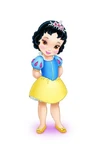
Snow White
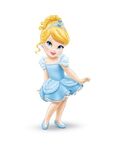
Cinderella
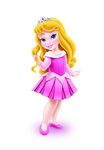
Aurora
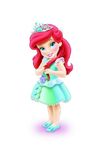
Ariel
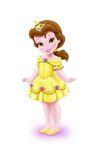
Belle
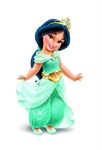
Jasmine
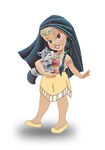
Pocahontas

Mulan
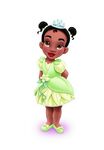
Tiana
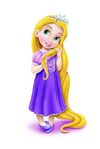
Rapunzel

Merida
Palace Pets
In July 2013, the Princesses received a spin-off franchise called Palace Pets. Currently, 10 of the 12 Princesses have more than two Palace Pets.
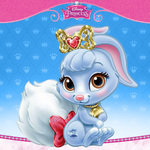
Berry (Snow White)
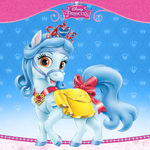
Sweetie (Snow White)
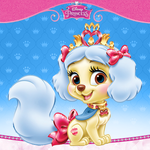
Muffin (Snow White)
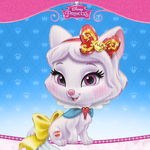
Honeycake (Snow White)
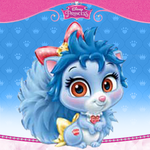
Thistleblossom (Snow White)
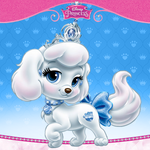
Pumpkin (Cinderella)
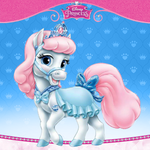
Bibbidy (Cinderella)
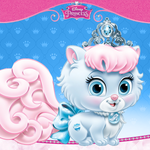
Slipper (Cinderella)
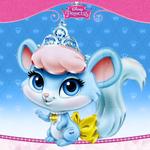
Brie (Cinderella)
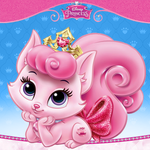
Beauty/Dreamy (Aurora)
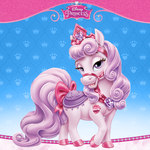
Bloom (Aurora)
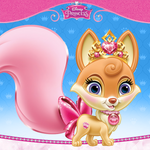
Nuzzles (Aurora)
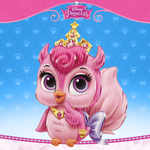
Fern (Aurora)
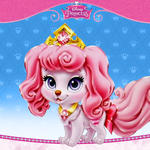
Macaron (Aurora)
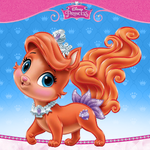
Treasure (Ariel)
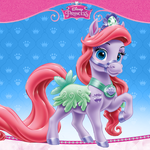
Seashell (Ariel)
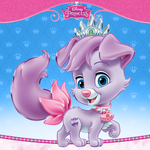
Matey (Ariel)
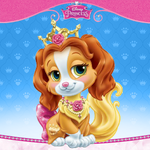
Teacup (Belle)
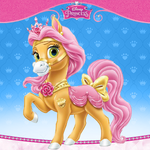
Petit/Petite (Belle)
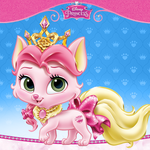
Rouge (Belle)
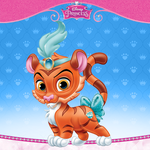
Sultan (Jasmine)
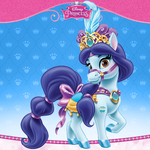
Lapis (Jasmine)
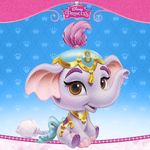
Taj (Jasmine)
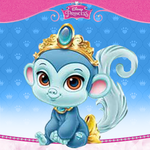
Nyle (Jasmine)
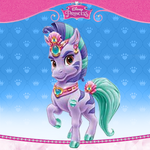
Stripes (Jasmine)

Brook (Pocahontas)
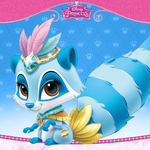
Windflower (Pocahontas)
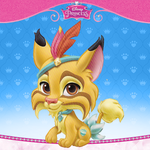
Pounce (Pocahontas)
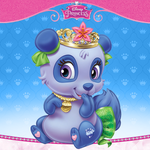
Blossom (Mulan)
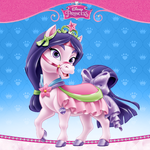
Lychee (Mulan)
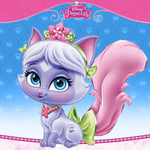
Plumdrop (Mulan)
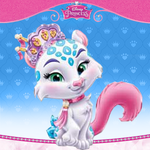
Snowpaws (Mulan)
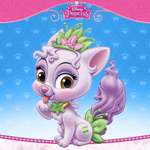
Lily (Tiana)
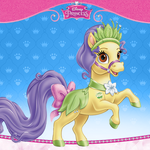
Bayou (Tiana)
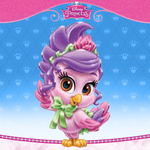
Birdadette (Tiana)
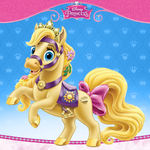
Blondie (Rapunzel)
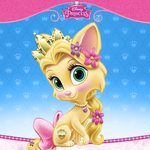
Summer (Rapunzel)
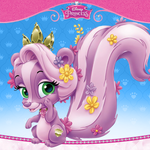
Meadow (Rapunzel)
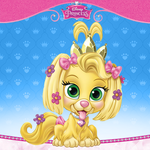
Daisy (Rapunzel)
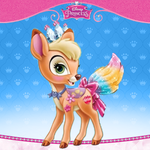
Gleam (Rapunzel)
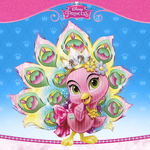
Sundrop (Rapunzel)
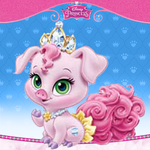
Truffles (Rapunzel)
Other media
Kingdom Hearts series
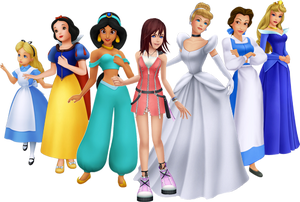
In the games, five of the official princesses are part of the Seven Princesses of Heart (セブンプリンセス Sebun Purinsesu), a group of maidens with hearts of pure Light, devoid of Darkness, and were created when the X-blade was split into seven pieces of light and thirteen of darkness. They are referred to this name because they allow access to the Door to Darkness when gathered together, and whoever gathers them will gain the power to rule over the worlds. The members in this incarnation are:
- Kairi
- Alice
- Snow White
- Jasmine
- Belle
- Cinderella
- Aurora
Notably, two other Disney Princesses, Ariel and Mulan, appear as well but are not Princesses of Heart. Instead, they serve as party members that fight alongside Sora in their journey to save the worlds.
In Kingdom Hearts 3D: Dream Drop Distance, it was revealed that another generation of the Princesses of Heart exists, and is elaborated upon in Kingdom Hearts III. Referred to as the "New Seven Hearts of Light", these pure-hearted maidens consist of the more recent members from the Disney Princess franchise.[22] Each inherit the title from previous members who no longer have need for the position once they willingly accept light over darkness. Kairi is the only member from the original group that is part of the new seven lights. Rapunzel, Anna, and Elsa are potential candidates; unfortunately, they become targets to Organization XIII as part of their fall-back plan in case the seven guardians of light cannot congregate. Pocahontas, Tiana, Merida, and Moana are the only ones who haven't appeared in the Kingdom Hearts series yet.
Kilala Princess series
In the manga series, six of the official Princesses appear, each having the power to bring peace to the world. After her best friend Erica is kidnapped, Kilala uses the power of the Magic Tiara to open the Gate of Dreams in order to find her, interacting with each of the Princesses and receiving a gem from each of them to power the Tiara during this time. Using the six gems she'd collected, Kilala manages to free the citizens of Paradiso from Valdou's control - gaining the final gem when she accepts that she is the seventh Princess and chooses to become one in her own way. The seven Princesses appear as follows:
- Snow White
- Ariel
- Aurora
- Cinderella
- Jasmine
- Belle
- Kilala Reno
Ralph Breaks the Internet
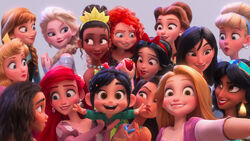
In the 2018 Walt Disney Animation Studios film, digital versions of the princesses (described as "netizens") appear as residents of the Internet. Vanellope von Schweetz encounters the group during her visit to Oh My Disney; in during which, Vanellope reveals herself to be the princess of Sugar Rush and is subsequently inducted into the line-up. Not including Vanellope, the fourteen official members of the court are designated as:
- Snow White
- Cinderella
- Aurora
- Ariel
- Belle
- Jasmine
- Pocahontas
- Mulan
- Tiana
- Rapunzel
- Merida
- Anna
- Elsa
- Moana
A toy line based on the princesses as they appear in Ralph Breaks the Internet was launched following the film's release. Dubbed "Comfy Squad" or "Comfy Princesses", the sub-franchise includes merchandise depicting the princesses in their casual clothes from the movie. Vanellope acts as the line's mascot.[23] [24] Since they're not official members of the franchise, Anna and Elsa are only occasionally featured in the line.
Disney Parks
Mickey's Pirate and Princess Party
Beginning on January 22, 2007, the Magic Kingdom at Walt Disney World hosted their newest hard ticket (separate admission) event, "Disney's Pirate and Princess Party", renamed "Mickey's Pirate and Princess Party" in 2008. The event combines the "Pirates of the Caribbean" attraction and movie series and the Disney Princess line, and cosplaying as both pirates and royalty is encouraged. Visitors can have meet and greets with characters from both franchises, and the other classic characters dressed as buccaneers and royals, and take part in various activities. Other features include the "Disney's Enchanted Adventures Parade" and the "Magic, Music and Mayhem" fireworks spectacular. Because the event has become so popular, Pirate and Princess events have become an annual hard-ticket staple with dates into August and September of 2007 and January through June of 2008.
Gallery

Trivia
- As of 2021, there are a total of twelve Princess films featuring nine Princesses (6 by birth, 3 by marriage), one heroine and two that are daughters of a chief (the first one is recognized as a princess, while the second one is recognized as a heroine).
- The line-up also features eight characters loosely based on fairy tales (Snow White; Cinderella; Aurora from "Sleeping Beauty"; Ariel from "The Little Mermaid"; Belle from "Beauty and the Beast"; Jasmine from "Aladdin and the Magic Lamp"; Tiana from "The Frog Prince"; and Rapunzel), one character based on a real person (Pocahontas), one character based on a legend (Mulan), and two characters that don't pre-exist (Merida from Brave and Moana).
- Initially, one of the unspoken rules of the franchise is that none of the Princesses can ever make eye contact in any official merchandise, keeping their "mythologies" separate. The Disney Princesses were designed to have all the Princesses unaware of each other's presence.
- Roy E. Disney was against the creation of the Disney Princess franchise, as he said, "Cinderella and Snow White could never be seen together because their stories take place in different times and places."
- Going against the marketing strategy of the franchise, the Princesses, along with Vanellope, Anna, and Elsa, interact with each other for the first time in Ralph Breaks the Internet.
- The reasoning for including Anna and Elsa in the film's variation of the line-up was due to the filmmakers recognizing the unofficial Princesses as princess characters that have the strongest association with the franchise, as well as sharing the connection of being from Walt Disney Animation with Vanellope.[25]
- As of 2021, as part of the Ultimate Princess Celebration, Disney has released promotional photos of the Princesses interacting with each other and acknowledging each other's presence.
- As of 2021, Snow White and Merida are the only Princesses who have never had a sequel or spin-off.
- Out of all the twelve Princesses, seven of them have used magic actively on others or their surroundings: Cinderella and Aurora with wands, Ariel with her father's trident, Belle with the Enchanted Mirror, Jasmine with the Carpet, Rapunzel with her hair, and Merida with the Spell Cake.
- Each of the Princesses have their own outfits which represent their uniqueness and character in the franchise:
- Snow White, Jasmine, and Merida all wear casual attire.
- Jasmine is also the only Princess to wear trousers as part of her outfit.
- Cinderella and Belle both wear ball gowns.
- Aurora is the only Princess to wear a typical princess gown.
- Ariel is the only Princess to be seen in her mermaid tail or wearing a bouffant gown as a human.
- Pocahontas, Mulan, and Moana all wear their ethnic outfits.
- Moana is also the only Princess to wear a skirt as part of her outfit.
- Tiana is the only Princess to wear a wedding gown (without the veil). She is also the only Princess to wear a wedding gown that is not white (the color is green in her case); although she does have a separate white wedding gown, which was used in her second wedding.
- Rapunzel, Belle, Mulan and Cinderella are the only Princesses to wear peasant dresses (Aside from Aurora when she was in the forest as Briar Rose).
- Snow White, Jasmine, and Merida all wear casual attire.
- Pocahontas is the only Princess to wear her signature outfit throughout the course of her entire film.
- In Ariel's case, she was seen as a mermaid for most of her time onscreen, while only seen briefly in her bouffant gown as a human during her dinner with Prince Eric and Grimsby.
- Snow White is briefly seen wearing a ragged dress in her film.
- Cinderella was only seen wearing her gown when she went to the ball.
- Aurora was only seen wearing the pink version of her dress during her dance with Prince Phillip at the end of her film.
- Belle was only seen wearing her gown twice in her film: when she had both dinner and a dance with the Beast, as well as dancing with the Beast once again in his human form at the end of the film.
- Mulan was only seen in her signature outfit during the first part of her film, as she spends the rest of it dressed up as a soldier.
- Tiana was only seen in her signature outfit during her first wedding with Prince Naveen.
- Jasmine wears a low class garment over her signature outfit when she disguises to leave the palace, a different dress when Jafar takes over Agrabah and a slave dress in the film's climax.
- Rapunzel is briefly seen in a pale pink dress in the final scene of her original film.
- Moana gains a new chief's outfit during the final sequence of her film.
- Merida wears a sky blue dress during the archery competition at the beginning of her film.
- Moana is the only Princess not to be seen wearing a garment that has a shade of blue.
- However, she does have an accessory that incorporates the said color (the pendant of her grandmother's necklace).
- Snow White has a blue bodice for her signature outfit.
- Cinderella's ball gown has been recolored from silver to blue for the franchise.
- Aurora has an alternative blue princess dress, opposing to the signature pink that she has.
- Ariel was seen wearing a blue dress while touring around Prince Eric's kingdom.
- Belle's signature peasant dress incorporates the shade of blue.
- Jasmine's turquoise outfit can be considered a shade close to that of blue.
- Pocahontas wears a blue shirt as part of her comfy outfit in Ralph Breaks the Internet.
- Mulan was seen wearing a dress with the color blue during the final battle with Shan Yu.
- Tiana was seen wearing a blue princess costume during Charlotte La Bouff's welcoming party for Prince Naveen.
- Rapunzel was seen wearing a blue nightgown in her TV series.
- Merida's teal outfit can be considered a shade close to that of blue.
- However, she does have an accessory that incorporates the said color (the pendant of her grandmother's necklace).
- Merida and Moana are currently the only Disney Princesses to not have love interests, though both were originally going to have love interests. Young MacGuffin was intended to be Merida's Prince during production, before it was ultimately decided she would remain single.
- Merida is unique among the Disney Princesses in that she's the only one to be from a Pixar film, isn't based on a real person or literature, and doesn't have any onscreen singing moments in her film. Merida's also the first Disney Princess to display an actual accent.
- Moana is also unique among the Disney Princesses in that she's the only one from a Disney film that isn't based on a real person or literature.
- Regarding the relationship status of the Princesses:
- Snow White, Aurora, Ariel and Rapunzel are the only Princesses who are both royal by birth and marriage as they all end up with men who were also born into royal families.
- Belle and Tiana are the only Princesses born as commoners that become royalty through marriage as they all ended up with men who were born into royal families. Before she got married, Cinderella was not born a monarch or a commoner, but was still born into the upper class before her stepfamily turned her into a servant girl, as her late father was an aristocrat.
- Coincidentally, all three Princesses wear opera gloves and aprons.
- Jasmine's the only Princess who is royal by birth that marries a commoner.
- Pocahontas is the first Disney Princess with two love interests, John Smith and John Rolfe. She is the only Disney Princess to not end up with her original love interest however, and falls in love with John Rolfe (who she married in real life) in the sequel. Despite that, John Smith is still regarded as Pocahontas' official love interest.
- Mulan is the only Princess who's neither royal by birth nor marriage. Instead, she marries Li Shang, a captain of the Chinese army.
- However, Mulan would have become a princess had she married Prince Jeeki at the end of Mulan II.
- Merida and Moana are the only Princesses to remain single as they don't have love interests in their respective films.
- However, it should be noted that Merida had an arranged marriage as a conflict.
- Each Princess is represented by one or more objects:
- Snow White – red apple
- Cinderella – glass slipper, pumpkin
- Aurora – golden tiara, spindle, spinning wheel, pink rose
- Ariel – dinglehopper, seashell, trident
- Belle – book, red rose, mirror
- Jasmine – the magic lamp, flying carpet, lotus
- Pocahontas – her mother's necklace, feather, compass, leaves
- Mulan – peach blossom, oil-paper umbrella, fan, sword
- Tiana – lily pad flower, gumbo pot, her wedding tiara
- Rapunzel – sun insignia, lantern, paintbrush, the Sundrop Flower
- Merida – bow/arrow, will o' the wisp, bear pendant
- Moana - Heart of Te Fiti, seashell, her grandmother's necklace, oar, pink plumeria
- Except for Merida, each Princess has their own "I Want" song:
- Snow White – "I'm Wishing"
- Cinderella – "A Dream Is a Wish Your Heart Makes"
- Aurora – "I Wonder"
- Ariel – "Part of Your World"
- Belle – "Belle (reprise)"
- Jasmine – "Speechless" (live-action remake)
- Pocahontas – "Just Around the Riverbend"
- Mulan - "Reflection"
- Tiana – "Almost There"
- Rapunzel – "When Will My Life Begin"
- Moana - "How Far I'll Go"
- Mulan and Tiana are the only Princesses to kill the main antagonist in their films. Mulan has actually killed more people than any other Disney character, having buried (almost) an entire Hun army in a snow avalanche from which few escaped and survived.
- Moana is the only Princess to redeem her primary antagonist (before turning into Te Kā, Te Fiti was a source of goodness to the islands, until Maui stole her heart, which ultimately caused her to become a destructive entity). She is also the only Princess so far to encounter two antagonists in one film, and the only one to encounter both a male and female antagonist in the same film.
- The first eight Princesses were once represented as elements on a periodic table at a candy store at Downtown Disney in Orlando, FL.
- Snow White: S - sulfur
- Cinderella: C - carbon
- Aurora: Au - gold
- Ariel: Ai - fictional
- Belle: B - boron
- Jasmine: J - jodium, former name of iodine
- Pocahontas: P - phosphorus
- Mulan: Ml - fictional
- Rapunzel was the first Princess in the franchise to be computer-animated, rather than traditionally hand-drawn. However, she and the other computer-animated Princesses have hand-drawn redesigns when appearing with the other Princesses in merchandise or pictures.
- Several of the Disney Princesses are animated by the same person. Marc Davis animated Snow White, Cinderella, and Aurora. Glen Keane animated Ariel, Pocahontas, and Rapunzel. Mark Henn animated Belle, Jasmine, Mulan, and Tiana.
- There are seven Caucasian Princesses: Snow White and Rapunzel (German), Cinderella, Aurora and Belle (French), Ariel (Mediterranean) and Merida (Scottish). The five non-Caucasian Disney Princesses are Jasmine (Arabian), Pocahontas (Native American), Mulan (Chinese), Tiana (African American), and Moana (Polynesian).
- Tiana is the first Disney Princess to have a public coronation as all the Princesses up to Mulan were already in the line-up when the franchise first launched in the early 2000s.
- Moana is the first Princess to be inducted into the franchise without a public coronation; the method of her inclusion was drawn towards merchandise and social media promotion instead.
- Snow White and the Seven Dwarfs was the only film in the franchise which won an honorary Oscar. Brave won an Oscar as Best Animated Feature Film of the Year. The Little Mermaid, Beauty and the Beast, Aladdin, and Pocahontas won two Oscars (Best Soundtrack, Best Original Song). Cinderella, Sleeping Beauty, Mulan, The Princess and the Frog, Tangled, and Moana received award nominations.
- Cinderella, Tiana, Rapunzel, Merida, and Moana are shown as children in their original films. Ariel is shown as a child in her prequel movie, The Little Mermaid: Ariel's Beginning.
- Ariel is the only Disney Princess who isn't born a human, but she eventually becomes a human.
- Ariel is also the first Disney Princess to have a child.
- Out of the twelve Princesses in the line-up, only five are actually seen getting married on screen: Cinderella, Ariel, Jasmine, Tiana, and Rapunzel. Jasmine got married in the sequel Aladdin and the King of Thieves, and Rapunzel got married in the short, Tangled Ever After. Mulan almost gets married in the sequel Mulan II to a prince of a neighboring kingdom for political reasons, but Mushu interferes and stops the marriage.
- Cinderella, Aurora, Belle, Jasmine and Mulan are so far the only Princesses to have a live-action remake of their original films, though Aurora's film was reimagined to focus on Maleficent's point of view. Ariel and Snow White are confirmed to have a live-action remake of their respective movies in development.
- Pocahontas is the only pre-Revival era princess to not have a confirmed live-action adaptation of her film.
- Out of all twelve Princesses, Snow White and Cinderella are the only orphaned Princesses; Aurora, Mulan, Rapunzel, Merida and Moana have both their parents alive; Ariel, Belle, Jasmine, and Pocahontas have only their fathers alive; and Tiana is the only one who has her mother alive while her father died.
- Tiana is unique with this as her deceased parent is seen at the beginning of the film and died later on.
- Fa Mulan is the only Disney Princess to have a known last name.
- Aurora and Mulan are the only Disney Princesses to go by aliases (Aurora as "Briar Rose" and Mulan as "Ping"). Although in Aurora's case, she thought Briar Rose was her real name until she was informed of her true identity.
- Snow White, Cinderella, Belle, Pocahontas, Mulan and Rapunzel's names are from their original stories.
- Snow White, Cinderella, Pocahontas, Mulan, and Moana are the only Princesses to have their names eponymous to the title of their respective films. Aurora, Ariel, Belle, and Tiana are the only Princesses to have film titles referencing to their character. Jasmine is the only Princess to have the title of her film eponymous to her love interest. Rapunzel and Merida are the only Princesses to have adjectives as film titles (although at one point, Rapunzel's film title was originally going to be eponymous during the production).
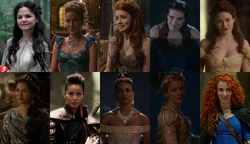
The 10 official Disney Princesses as portrayed in Once Upon a Time.
- The Disney Princesses have appeared in the ABC series Once Upon a Time, with the series centering on Emma Swan, the daughter of Snow White who has to break a curse. The ABC Studios is owned by Disney, and therefore they have rights to the Princesses. Snow White, Aurora, Ariel, Belle, Jasmine, Mulan, Tiana, and Merida have all appeared on the show. The series has also featured two different versions of Cinderella and Rapunzel.
- Pocahontas and Moana are the only Princesses who did not appear on the show, nor did they appear in the spin-off.
- Only four of the twelve Princesses (Jasmine, Mulan, Rapunzel and Merida) have appeared as playable characters in Disney Infinity.
- Moana was to be added, but has never happened due to the series' cancellation.
- Pocahontas and Moana are the only Princesses who didn't appear in the series Sofia the First.
- According to a producer, Pocahontas wasn't able to appear in the show because it was difficult to create an episode involving her character.
- Sofia the First ended in 2018, Moana was only inducted as an official Disney Princess a year later.
- Ironically, despite most of them having a royal status (in Mulan's case, a recognizable status), a majority of the Princesses were seen doing physical labor (chores or servant work).
- Ariel and Pocahontas are the only Princesses who weren't seen doing any form of physical labor.
- Except for Cinderella, Ariel, and Merida, all the Disney Princesses are shown to have no siblings.
- Ariel is the youngest of seven daughters (Attina, Alana, Adella, Aquata, Arista, and Andrina are her six older sisters) while Merida's the oldest and only daughter of four children (Harris, Hubert, and Hamish are her three younger brothers).
- Biologically-speaking, Cinderella's an only child. However, through her father's marriage to Lady Tremaine, she gained two stepsisters, Drizella and Anastasia.
- Belle was originally going to have two older sisters. However that idea was ultimately scrapped due to the possibility of them being confused with Cinderella's stepsisters.
- Another concept included Belle having a younger sister named Clarice, although that concept was eventually scrapped too.
- Mulan's an only child in her original animated film, but has a younger sister in her live-action remake.
- The original literary source has stated that Mulan had a younger brother.
- At one point, Moana was going to be the youngest and only daughter of ten children before the idea was ultimately scrapped.
- Although Rapunzel had no siblings in her original movie, her TV series, Tangled: The Series, revealed that Mother Gothel had a daughter before kidnapping Rapunzel and coincidentally, that daughter became Rapunzel's lady-in-waiting known as Cassandra. This would make them adoptive sisters.
- Of the Princesses who officially have siblings, Ariel and Merida are the only ones with biological siblings. Cinderella and Rapunzel are the only ones with no blood-related siblings, but acquired siblings through either marriage or adoption.
- Out of the twelve Princesses, Ariel, Jasmine, Tiana, Rapunzel, and Moana are the only ones to be the protagonists (or in Jasmine's case, deuteragonist) of animated series based on their respective movies: The Little Mermaid for Ariel, Aladdin for Jasmine, Tiana for Tiana, Tangled: The Series for Rapunzel, and Moana, The Series for Moana.
- In 2011, Jodi Benson, Paige O'Hara, Linda Larkin, Anika Noni Rose and Lea Salonga were named Disney Legends. At the ceremony Benson, O'Hara, Rose, and Salonga sang "A Dream Is a Wish Your Heart Makes" together. Benson's, O'Hara's, Larkin's, and Rose's plaques are presented together on the same post at the Team ― Disney Michael D. Eisner Building. In 2019, Ming-Na Wen was also named a Disney Legend.
- Ron Clements and John Musker have directed the most of the official Disney Princess films, with four entries.
- Jodi Benson, Jennifer Hale, and Auli'i Cravalho are the only actresses to play more than one Disney Princess in a Disney production. Benson voiced Belle in addition to her regular role as Ariel in episodes of House of Mouse, Hale served as the voice actress for both Cinderella and Aurora from 2001-2010, and Cravalho played Ariel in the 2019 TV special The Wonderful World of Disney: The Little Mermaid Live! after voicing Moana. Lea Salonga is also the only woman to provide the singing voices for two Disney Princesses: Jasmine and Mulan.
- Mulan and Moana are the only Princesses not to have celebrities pose as them for the Disney Dream Portrait Series.
- The whole Disney Princess concept was parodied in the Guardians of the Galaxy episode "Black Vortex" with Gamora going to a parallel universe where she is a princess.
- On February 6, 2021, shopDisney released merchandise for the upcoming animated film Raya and the Last Dragon. Some of the released merchandise was described as part of Disney Princess collections, specifically the merchandise focusing around the main character, Raya. This goes as well with the deuteragonist of the film, Sisu. Disney has yet to officially confirm either of their inductions into the franchise. However, in September of that year, the new dolls released in plastic-free packaging were labeled as part of Disney Classic Doll Collection.
- When Vanellope von Schweetz tells the Disney Princesses she doesn't have a mom, the motherless Princesses all huddle up to her and say "Neither do we," while the Disney Princesses with mothers can be seen in the camera angle when Rapunzel asks if she thinks all her problems can be solved by a big strong man.
- Snow White is the only Disney Princess whose father never appears in her original film.
- Each of the Disney Princess theme songs are a reflection of the way that the Princesses were marketed during the time of the respective song's release.
- "If You Can Dream" was released when the Princesses were still marketed as damsels and romantics.
- "The Glow" was released when the Princesses were slowly being marketed as independent women.
- "Live Your Story" and "Starting Now" were both released at a time when the Princesses were already established as heroines.
See also
- Disney Fairies
References
- ↑ [1]
- ↑ Disney's Princess Collection
- ↑ "Disney Princess Magazine celebrates increase in sales as it turns 21", Egmont Group (January 23, 2019).
- ↑ Disney Princess Magazine
- ↑ Disney Prinsesser
- ↑ Disney Store Catalog
- ↑ 7.0 7.1 Disney Princess Fashion Figures
- ↑ 8.0 8.1 8.2 Disney Princess Sing-Along Songs - Once Upon a Dream
- ↑ Disney Princess Puzzle
- ↑ 10.0 10.1 10.2 10.3 10.4 Disney Princess Dolls
- ↑ 11.0 11.1 Disney Princess: "It's Not Just Make Believe" Music Video
- ↑ 12.0 12.1 12.2 Disney Princess Sing-Along Songs Vol. 2 - Enchanted Tea Party
- ↑ 13.0 13.1 Disney Princess Sing-Along Songs Vol. 3 - Perfectly Princess
- ↑ 14.0 14.1 14.2 Disney Princess Magazine
- ↑ 15.0 15.1 15.2 15.3 Disney's Princess Storybook Collection: Love and Friendship Stories
- ↑ Kingdom Hearts series
- ↑ 17.0 17.1 17.2 Princess Collection 2
- ↑ Once Upon a Princess: Volume 1
- ↑ 19.0 19.1 Disney Princess: Journey to London
- ↑ 20.0 20.1 20.2 Ralph Breaks the Internet
- ↑ Amazon.com Store
- ↑ "Nomura talks about "Let It Go", the gameplay of Arendelle and The Carribean, the new Princesses of Heart and Situation Commands in Kingdom Hearts III". KH13 (June 17, 2018).
- ↑ https://www.shopdisney.com/vanellope-with-comfy-princesses-dolls-gift-set-ralph-breaks-the-internet-460020912866.html Comfy Princess Doll Set]
- ↑ [2]
- ↑ "Ralph Breaks the Internet: Inside the Disney Princess scene everyone's talking about". IGN (September 20, 2018).
External links
| v - e - d | ||||||||
|---|---|---|---|---|---|---|---|---|
|
Disney Princess Lost in the Real World
Source: https://disney.fandom.com/wiki/Disney_Princess

0 Response to "Disney Princess Lost in the Real World"
Postar um comentário